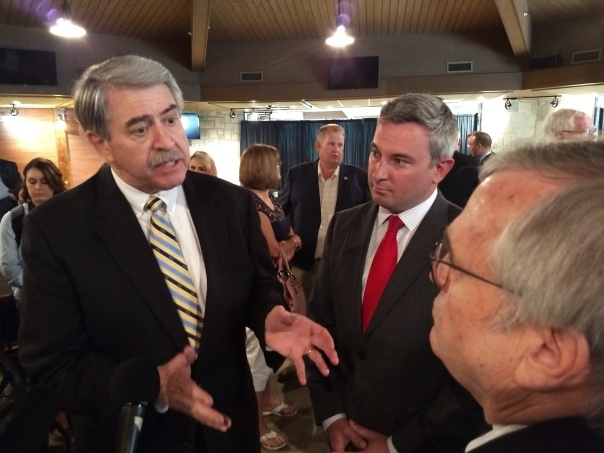USDA undersecretary talks trade in Kentucky
(A version of this article appears in the June 21, 2018 edition of The Farmer’s Pride)
by Ray Bowman
United States Department of Agriculture undersecretary for trade Ted McKinney came to Lexington to speak to the 2018 state FFA convention but managed to work in a couple of other stops in the process.
McKinney addressed a meeting of the Kentucky Agriculture Council and joined the Commonwealth’s ag commissioner Ryan Quarles for a roundtable discussion on the current tumultuous international trade situation at the Limestone Café at Keeneland’s sale pavilion.

USDA undersecretary for trade Ted McKinney and Agriculture Commissioner Ryan Quarles field questions from Al Cross, director of the University of Kentucky’s Institute for Rural Journalism and Community Issues
“Agriculture is completely dependent on foreign markets,” Quarles stated as he opened the session. “The American farmer, and more importantly the Kentucky farmer is so efficient in what they do that we depend upon selling our products outside the United States to be successful.”
“I think we’re at a very fascinating time that many case studies will be written about what I call ‘right-sizing’ or making adjustments in trade,” McKinney said about the trade negotiations that are ongoing with some of the country’s largest trading partners.
“There’s a lot of anxiety out there” McKinney continued. He also noted that there are quite a few imbalances that have, for some time, needed to be addressed.
“We have our markets pretty much wide open,” McKinney said. “Tariffs are low, and if you meet the goals on food safety and equivalency and livestock and poultry, bring it on in. We are free traders, for the most part.”
“It is not that way around the world,” he continued. “It’s probably time, and long overdue, for an adjustment, and that’s what we’re going through.”
McKinney pointed to the barriers to trade created by fears our partners profess about perceived issues with the uncertainty of seed technologies and diseases in poultry and livestock and admitted that there is a lot to fix.
“It probably would have been folly for us to have thought that it would be an easy thing to say to those countries ‘would you please stop doing that’ and not have to have some sort of enforcement and not feel some pain in return. I think that’s what we’re doing.”
“Do I believe that President Trump has our back?” McKinney rhetorically asked. “Yes, I do. I do also believe the president when he said he would not let agriculture be the ‘tip of the spear’ and suffer the consequences on what we do on trade.”
McKinney says he bases that belief on what he has experienced first-hand as well as assurances from his current boss, USDA secretary Sonny Perdue and from “my former boss, a guy named Pence.” McKinney served as agriculture director in Indiana during vice president Mike Pence’s term as governor.
Foreign trade has been a hot-button issue since the beginning of the current administration. On January 23, 2017, three days after his inauguration, Donald Trump signed a presidential memorandum to withdraw the United States’ signature from the Trans-Pacific Partnership agreement, making its ratification virtually impossible.
In July 2017 the administration began the process of re-evaluating and renegotiating the North American Free Trade Agreement (NAFTA).
American farmers fear that potential changes to these and other trade policies currently under consideration by the Trump administration could adversely impact the industry.
Posted on June 21, 2018, in Uncategorized. Bookmark the permalink. Leave a comment.


Leave a comment
Comments 0